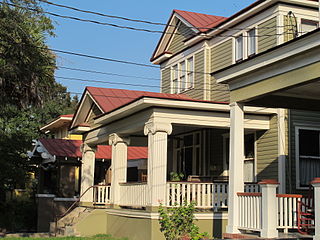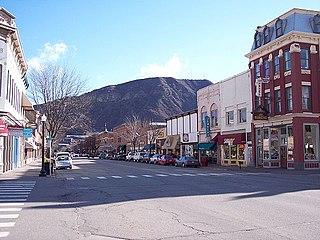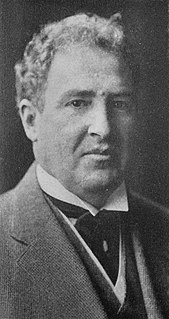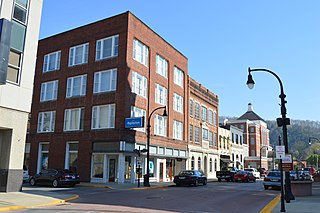Moultrie Commercial Historic District | |
Colquitt Towers, formerly the Colquitt Hotel | |
| Location | Roughly bounded by NE. First Ave., SE. Second Ave., W. First St. and E. Fourth St., Moultrie, Georgia |
|---|---|
| Coordinates | 31°10′48″N83°47′14″W / 31.18°N 83.787222°W Coordinates: 31°10′48″N83°47′14″W / 31.18°N 83.787222°W |
| Area | 48 acres (19 ha) |
| Architect | A.J. Bryan and Company, T.F. Lockwood, others |
| Architectural style | Art Deco, Late 19th And Early 20th Century American Movements, Late 19th And 20th Century Revivals |
| NRHP reference # | 94000543 [1] |
| Added to NRHP | June 3, 1994 |
The Moultrie Commercial Historic District, in Moultrie in Colquitt County, Georgia, is a 48 acres (19 ha) historic district which was listed on the National Register of Historic Places in 1994. The district is roughly bounded by NE. First Ave., SE. Second Ave., W. First St. and E. Fourth St. In 1994, the district included 61 contributing buildings and one contributing object. [1] It also included 17 non-contributing buildings. [2]
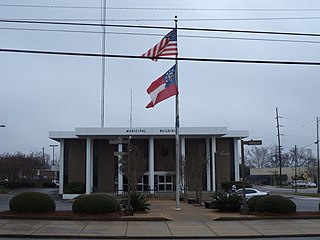
Moultrie is the county seat and largest city of Colquitt County, Georgia, United States. It is the third largest city in Southwest Georgia, behind Thomasville and Albany. As of the 2010 census, Moultrie's population was 14,268. It was originally known as Ochlockoney until it was incorporated by the Georgia General Assembly in 1859.

Colquitt County is a county in the U.S. state of Georgia. As of the 2010 census, the population was 45,498. The county seat is Moultrie. The county was created February 25, 1856 and is named for Walter Terry Colquitt, a U.S. senator.

The National Register of Historic Places (NRHP) is the United States federal government's official list of districts, sites, buildings, structures, and objects deemed worthy of preservation for their historical significance. A property listed in the National Register, or located within a National Register Historic District, may qualify for tax incentives derived from the total value of expenses incurred preserving the property.
The district included three properties which were already separately listed on the National Register:
- Colquitt County Courthouse (1902), listed in 1980, designed by A.J. Bryan and Company
- Colquitt County Jail (1915), listed in 1980
- Carnegie Library of Moultrie (1909), listed in 1982, designed by T.F. Lockwood. [2]

Colquitt County Courthouse is an historic government building constructed in 1902 and located at Courthouse Square in Moultrie, Georgia, the seat of Colquitt County.
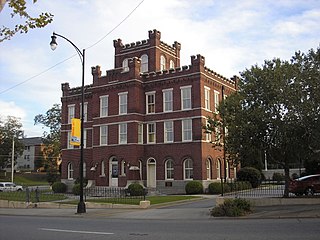
Colquitt County Jail is a historic jail building at 126 1st Avenue SE in Moultrie, Georgia that was built in 1915. It was added to the National Register of Historic Places in 1980.

The Carnegie Library of Moultrie is a historic Carnegie Library on a corner lot in downtown Moultrie, Georgia that was built in 1908. It was added to the National Register of Historic Places in 1982. It is located at 39 North Main Street.
The district includes Colquitt Towers, a former hotel which was called Colquitt Hotel, a four-story Colonial Revival-style building with balustrade and urns on roof and on arched openings. [2] :7

Colonial Revival architecture was and is a nationalistic design movement in the United States and Canada. Part of a broader Colonial Revival Movement embracing Georgian and Neoclassical styles, it seeks to revive elements of architectural style, garden design, and interior design of American colonial architecture.






